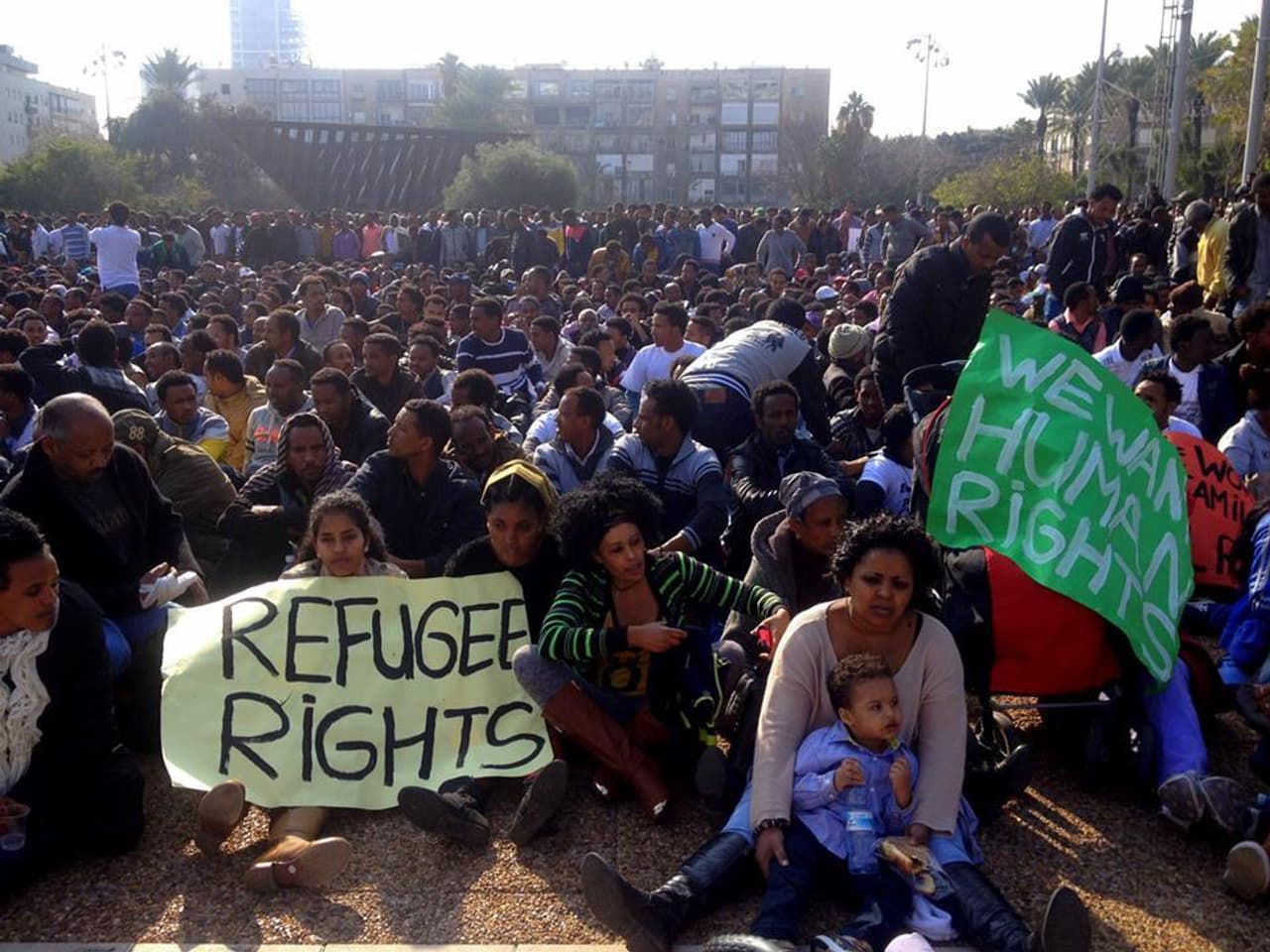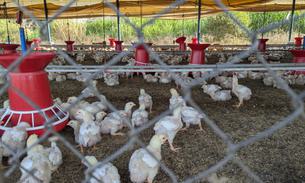
Returning to Sudan: migrants leaving Israel face persecution
Thousands of people protest in Tel Aviv (Credit: Claudia Levin)
Joseph Tuto wants to stop running. Tuto (not his real name), originally from the Nuba region of Sudan, trains in 400m, 800m and 1500m races and has won medals in professional international competitions for his efforts.
But for the past six years Tuto has lived a life on the run, fleeing internal conflict in his country to seek a better life for his family in Israel.
However, even after arriving in the country life for the Tutos remained a struggle. Israel’s ballooning influx of African migrants has led to the government detaining thousands of migrants. For the past two days thousands of African migrants have gathered in Tel Aviv square, demanding a stop to Israel’s new open-ended detention policy.
But Tuto was not among them.
Encouraged to leave by Israel, Tuto had already returned to his homeland, only to face persecution from the Sudanese government which strictly forbids its citizens from travelling to Israel.
Now Tuto is stuck between a refuge that does not want him, and a homeland that deems his past illegal.
‘I stayed in Israel for five years and six months and I worked as a cleaner in hotels,’ he told the Bureau of Investigative Journalism.
‘Life in Israel is very hard for refugees. I worked from 6am to 5pm and then I trained [as a runner].’
‘My children also faced racism at school. In Israel you are like a machine. You work from day to night and you face racism from the highest ranked [person] to the lowest,’ Tuto said.
Soon life for the Tutos became unbearable and, faced with the prospect of being detained indefinitely, the family opted instead to leave, and try to return home.
Tuto accepted $1,500 from the Israeli government, part of an incentive scheme to leave.
‘Israel sent me and my family back via Egypt,’ Tuto explained. He could not be sent directly to Sudan as the 1951 Convention relating to the Status of Refugees prevents governments from sending people directly home if they will face persecution. Israel is a signatory to the convention.
I’d rather die than stay in Sudan… I regret leaving Israel. I feel tricked by the Israeli Government.”– Joseph Tuto
The family stayed in Cairo’s airport for just two hours and then travelled on to Sudan.
When Tuto arrived in Khartoum he told officials at the airport that the family had been in Egypt, in Sudan travel to Israel is expressly forbidden.
However the family was an easy spot for Sudan’s National Intelligence and Security Service (NISS). Tuto’s children, aged 7 and 5 years old, had lived most of their lives in Israel and so spoke Hebrew rather than Arabic.
After three days the NISS visited Tuto’s house in Khartoum. He was out at the time and the officials took his mother into custody for days. There she was questioned about the whereabouts of her son.
‘In Sudan, security forces were after me every day. They wanted to put me in jail,’ Tuto explained.
‘They would beat and intimidate my mother and my siblings,’ Tuto added.
Fearing for his life Tuto and his family went into hiding. ‘I moved from safe house to safe house. I was terrified every day and I moved between more than ten houses, staying with friends and family,’ says Tuto.
‘There is no security in my country, I couldn’t live there.’
‘I’d rather die than stay in Sudan,’ he added.
Tuto’s fear is substantiated by testimony from those caught by the Sudanese secret police.
Madgy El Bagdady is a British national with Egyptian and Polish family. In 2011 he traveled to Sudan and was intercepted by NISS officers. He spent 66 days in detention during which time he was beaten, tortured and subjected to a mock execution.
Bagdady was apparently suspected of being a pro-democracy activist and was questioned on his activities while in Egypt.
During one interrogation session his captors repeatedly asked him about connections to Israel.
He explained, ‘The first thing the NISS accused me of was being an Israeli agent and a spy, that seemed to be a common first accusation as it allowed them to secure the person for more questioning.’
‘My mother is Polish and they made the link to being Jewish, even though I told them I was an atheist. They asked me if my mother or father had ever been to Israel, if I had ever been. Even though I had a British passport they said it was a fake and I was Israeli.’
During his time in prison Bagdady had his foot broken and he saw and heard of people being suspended from bars, flogged and sodomised. He also witnessed the torture of two ten year old boys.
He was finally released and returned to the UK.
We are determined to remove the tens of thousands of infiltrators who are here”– Israeli Prime Minister Benjamin Netanyahu
Research by British NGO Waging Peace uncovered cases of five other men who travelled to Sudan from Europe and were met with imprisonment and inhumane treatment. Other NGOs report many of those returning to Sudan have disappeared, never to be heard of again.
Olivia Warham, Director of Waging Peace told the Bureau, ‘We have evidence that those Sudanese who travel abroad and then return to Sudan, often face detention, interrogation and torture simply for having sought asylum in a different country or for participating in political activities there.’
‘We have heard of instances where individuals who have traveled to the UK, Israel or elsewhere, are picked up at the airport in Khartoum on their return and taken immediately by NISS for interrogation – this usually means being held in a prison or ghost house with no access to a lawyer and being tortured during the interrogation,’ she added.
Fearing such treatment Tuto was forced to flee his homeland, to another African country. ‘I had my children with me and was dragging all our luggage.’
Now he is living with his family in a rented house in a foreign African nation. He has a one month permit to stay and the little money he has is slowly running out.
‘My children don’t go to school. We don’t leave the house. We don’t know anyone. We don’t know anything,’ he said sadly.
‘I regret leaving Israel. At least there I could work. I feel tricked by the Israeli Government.’
‘I still have $900 left. Our only hope is to be resettled to another country. I don’t have any other hope. I can’t work and I have no money.’
The only thing Tuto has left is to keep running. He is currently trying to train with a local running group.
The bigger picture
Tuto is just one of a growing number of Sudanese migrants choosing to leave Israel, convinced to return home by a government campaign designed to reduce the number of African migrants in the country.
Israel is a target destination for many of those fleeing central and West Africa, located as it is, as a gateway to Europe. The Population, Immigration and Border Authority of Israel record that there were 53,636 African migrants in Israel as of the end of September.
The vast majority of those migrants come from Sudan and Eritrea. The violence in those countries means migrants in Israel enjoy a ‘collective-protection’ status that means they cannot be repatriated.
Sudan and Israel consider each other enemies and do not have any diplomatic relations and Sudan has explicitly stated it will punish citizens who have travelled to Israel.
Unable to send the Sudanese migrants directly home the Israeli government have looked to other methods of dispersal.
Last year the Bureau of Investigative Journalism revealed that the Israeli government was issuing Sudanese migrants with South Sudanese documents and that several Sudanese people had been sent to the new, neighbouring country. On arrival they were rejected by South Sudanese border officials and sent back to Tel Aviv. The government argued the removals had been an honest mistake.
Now Israel is offering Sudanese migrants up to $3,500 to return back to Sudan via another country, allowing returnees to cover their tracks.
In November Israeli Prime Minister Benjamin Netanyahu told the cabinet, ‘We are determined to remove the tens of thousands of infiltrators who are here,’ before explaining that the measures were ‘proportionate and essential to protect the Jewish and democratic character of the state.’
Israel has repatriated around 2,600 migrants out of the Israel, many via a third country.
The alternative is detention. The Israeli government has allocated US$ 125 million to build ‘open’ detention facilities, where migrants will have to check in three times a day to ensure they are not working or trying to evade detention. People can be detained there indefinitely.
UNHCR’s representative in Israel, Walpurga Englbrecht, has now announced she is ‘particularly disquieted’ about the open-detention facilities and said, they ‘would appear to operate as a detention centre from where there is no release. This means in effect indefinite detention’.
She added, that warehousing refugees was not ‘in line with the 1951 refugee convention. Placing asylum seekers in duress that may force them to opt to return without having examined their asylum claims could amount to a violation’ of the refugee convention, she said.
Amnesty International has been charting the stories of migrants in Israel.
Director of Amnesty International Israel, Yonatan Gher explained, ‘Asylum seekers in Israel, the majority of whom are from Eritrea and Sudan, do not get access to fair and transparent asylum proceedings, have no work permits and no access to basic health and welfare services.’
With the introduction of the new Amendments to the Prevention of Infiltration Law on 10 December, those who enter Israel irregularly are put in immediate detention up to a year, after which they are transferred to a newly opened ‘open’ detention centre in the remote desert. Some have been transferred there after up to two years imprisonment. The only way for them to be released is by being deported.
‘Amnesty International believes that this treatment violates international law. Some people are driven to such acute despair that they sign so-called ‘voluntary’ return forms. A Sudanese prisoner, driven to sign ‘voluntary’ return form, told Amnesty International: ‘I would rather die in my own country than be in prison forever in Israel,’’ added Gher.
A spokesperson from the Israeli government explained, ‘the Israeli government has always firmly condemned any incitement to racial hatred.’
Amnesty International believes that this treatment violates international law”– Yonatan Gher
‘The marginal incidents are not representative of the Israeli society and are condemned by the government. Israel is multicultural, multi-religious, and multi-lingual and Israelis see cultural diversity as an enriching experience which they are proud to celebrate and cultivate.’
Dr Khalid Al Mubarak, a spokesperson for the Sudanese government, explained that the tensions between the two countries made caution necessary. ‘Some people go to Israel, some are recruited and trained [to fight the Sudanese government], and then they are sent back to the Sudan.’
However, he refuted the suggestion that the NISS used violence and torture, ‘Of course our security service would need to screen people [returning],’ he said, ‘but any tales of going to the family and beating them up, that is nonsense.’
A version of this article appeared on the Guardian online and in Haaretz.



